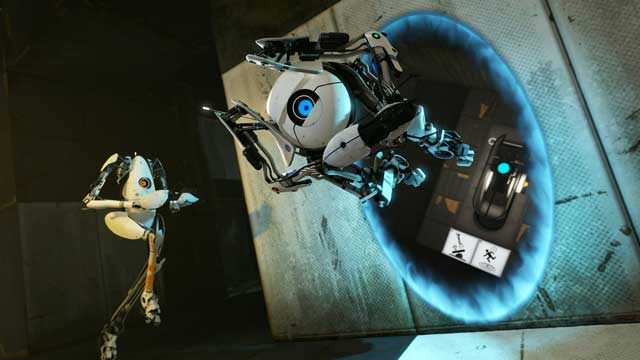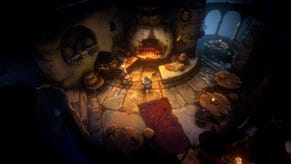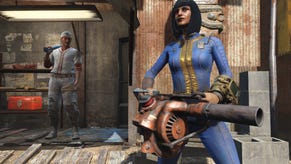Great puzzle games that aren't Portal

Great puzzle games that aren't Portal
Portal already gets the attention it deserves. And it’s probably already sitting in your Steam library. There’s a wealth of other puzzle games, however, that may not enjoy a popularity so befitting their worth. We’re fortunate to have seen their variety and prominence grow in recent years, even if they remain infrequent. Nowadays, even if you don’t consider yourself a fan of the genre, there’s probably a neat little title that’s right up your alley. Perhaps one of the games in this collection?

Infinifactory
Most puzzles have a single solution. A designer had a set of actions in mind and, hopefully, made the search for and discovery of those necessary steps a gratifying process.
Infinifactory is different. Infinifactory doesn’t have a lock and key to grapple with, but rather a suite of tools and work orders. There is a goal to reach, an object you must fabricate, but it is built through the freeform application of machine blocks, conveyor belts, rotators, and lasers. Your task is piecing together the assembly line.
An incomprehensibly large variety of constructions could fashion the same product, so how are you going to engineer yours? This is problem solving over solution discovery. Beginning new tasks can be daunting, but quirk and black humor surrounding your apparent enslavement by aliens breaks up the mental strain.

Braid
This one’s prose can be a bit vague, but understanding our character’s desire to save a woman is enough detail for a fantastic climax. Themes of regret and past mistakes do bleed through, and they’re met by time manipulation abilities wrinkled in a manner befitting each world’s theme. While the narrative, brushstroke art, and lovely music create a melancholy, dreamlike feel that’s nice to explore, Braid’s puzzle designs are its genuinely exceptional aspect.
One world sees a shadow of our protagonist carrying out the actions you just reversed, requiring that you work with your past to progress. Another ties the flow of time directly to your horizontal coordinates along a stage’s length, entangling the movement of obstacles to your own. It is persistently, astoundingly clever, and wrapping your mind around its challenges is an enormously rewarding experience.

Keep Talking and Nobody Explodes
A definite oddball, Keep Talking and Nobody Explodes could be construed as a party game. It certainly breeds sociable laughter and group excitement unlike anything else on this list.
Player one is staring down the clock of an explosive briefcase littered with inscrutable devices, buttons, and displays. He’s trying to diffuse this thing before it blows up in his face. Unfortunately, the instructions for disarmament lie in the hands of fellows who can’t see what he’s holding. What follows is a hasty, panicked back-and-forth as strange symbols are described, logic problems are rushed through, and life saving information slips away in the clamor.

Antichamber
Antichamber is about learning the rules. Our world functions in a specific way - if you walk in a circle, you should end up where you started. Antichamber doesn’t operate in accordance with reasonable assumption. Instead, it dreams up entirely unintuitive laws to revolve around, and besting its challenges means first deducing the ways things work.
Fortunately, the game is consistent about its inconsistencies. Once you’ve figured out a bizarre new behavior, you can safely predict results. There is as much joy in the learning as in the application. Eventually you’re submerged in a haze of pithy placards and puzzles based on deranged understanding, something uniquely perplexing and easy to find yourself completely lost in if you leave the game alone for too long.

Scribblenauts Unlimited
How often have you thought, “Oh geeze, this scenario would be so easy if I just had this one thing”? Well, get that thing. Use that thing. It’s likely stored somewhere in the vast dictionary of nouns Scribblenauts can summon into existence at your behest, and probably affects the other actors on stage just about how you’d expect.
Maxwell’s magic notebook conjures up anything written on its pages. Entertaining guests or dealing with thirsty vampires can be attempted with almost any object or entity he can think of - and if they’re not quite as he’d like, assigning adjectives will make them so. A ridable, claustrophobic, fire breathing were-cheeseburger may be exactly what is called for! Or maybe a plain old invisibility cloak. Scribblenauts isn’t particularly challenging or as finely designed as other options, but the opportunity for creative solutions and experimentation it presents is absolutely worth the investment.

The Talos Principle
This could have stopped at a great big collage of excellent puzzles. Classical era ruins and medieval Christian architecture house chambers within levels within worlds, a wide swathe of intelligent cogitative fodder. There’s the usual trickle of new things and advancement of understanding required of the player, but such are the least of the game’s intellectual successes.
The Talos Principle’s truest beauty lies not in its ability to inspire logical thought, but philosophical. It’s a piece of speculative science fiction where the voice of something called God resonates into a world flickering static at its seams, where CRT screens spur you to question your beliefs and the nature of your avatar breeds reflection on the nature of your self.

World of Goo
Introducing new stuff as a game progresses is standard practice. You try to keep things from growing stale for the player, right? What’s extraordinary about World of Goo is just how frequently it does so, never letting the blob settle long enough to stop wiggling. Constructing mostly-rigid towers and structures from sentient goop never lasts beyond a moment in a single form. New challenges, toys, and varieties of goo flow in a neverending stream of fresh accompanied by utterly delightful humor and spots of weirdly poignant emotion. To say nothing about its level of challenge, World of Goo never feels like a strain - just plain glee.

The Swapper
Somewhere in the quiet reaches of space is a device allowing for the immediate cloning of humans. More than mere warm bodies, they move in concert with the operator, letting him or her transfer consciousness between the identical vessels at will. Heights and feats normally beyond reach can be attained through able use, though a few clones may expire in the process.
The Swapper rolls its head-hopping into an atmospheric not-quite-horror story and explores implications that most games push neatly out of mind. Its narrative pulls you forward through difficult puzzles, keeping you nervously eager to discover just what’s going on in its derelict halls. Assets first modeled in clay before appearing in game lend it an oddly haunting, real quality.

The Witness
Eight years past, the man behind Braid has finally released his much anticipated followup, and critical response thus far has been fabulous. The Witness may look from a distance like little more than a pretty gallery of line-drawing puzzle boards, but it quickly unfolds into surprising diversity and lonely pondering.
Interestingly, you can approach the boards in close to any order you please, even attempting to pass gates barring the game’s final clusters the moment you step out onto the island. Some of them are self-enclosed exercises in deriving answers from complex symbology. Others have no discernible clues or structure, instead relating somehow to the beautiful environment you found it in. Much is done with an easily understood base.









